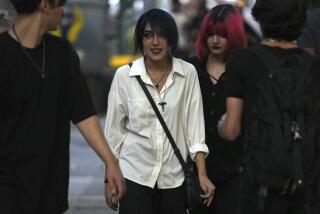In Saudi Arabia, world views collide
- Share via
BEIRUT — A verbal row between reformers and hard-liners is raging in Saudi Arabia, as the monarchy’s recent cautious steps toward modernizing the ultraconservative nation have ruffled the feathers of some uncompromising clerics.
On Sunday, a group of hard-line clerics exhorted authorities to ban women from appearing on television or in newspapers or magazines. On the same day, in an unusually bold move, Saudi human rights groups criticized the country’s religious police, who enjoy wide powers to enforce adherence to the strict mores of the Wahhabi sect of Islam.
The National Society for Human Rights urged the Saudi government to redefine the authority of the powerful Commission for the Promotion of Virtue and the Prevention of Vice, which it asserted was violating individuals’ rights.
Members of the religious police can raid private homes if they suspect that mixing between men and women or alcohol consumption is taking place inside. They also can arrest men and women unrelated by blood or marriage for simply sharing a table at a coffee shop.
In a report, human rights groups accused the religious police of “interrogating and sometimes assaulting and forcing [individuals] to confess under duress to acts they did not commit.”
The report lambastes the country’s discrimination against women, stressing the need to give women more facilities and opportunities at workplaces and to halt the marriage of underage girls.
Clerics do not seem ready to budge. A statement issued by 35 hard-line clergymen called for prohibiting music and music shows on television. They denounced what they called “the well-rooted perversity” at official cultural institutions, even book fairs. And they argued against any Saudi women appearing on television.
Saudi society has long restricted the rights of women. They are not allowed to drive or travel without permission of their husbands, fathers or brothers. A court recently sentenced a 75-year-old woman to 40 lashes for being in her home with two unrelated men. She argued that the men were merely bringing her food.
All this agitation by clerics follows several forward-looking steps by King Abdullah, including the appointment last month of the first woman to a ministerial post.
The monarch also dismissed leading fundamentalist clerics such as the head of the religious police, as well as the chief of the country’s highest religious tribunal, who called for killing television executives who spread “vice” in society through their broadcasts.
--
Rafei is a special correspondent. Times staff writer Borzou Daragahi contributed to this report.
More to Read
Sign up for Essential California
The most important California stories and recommendations in your inbox every morning.
You may occasionally receive promotional content from the Los Angeles Times.













